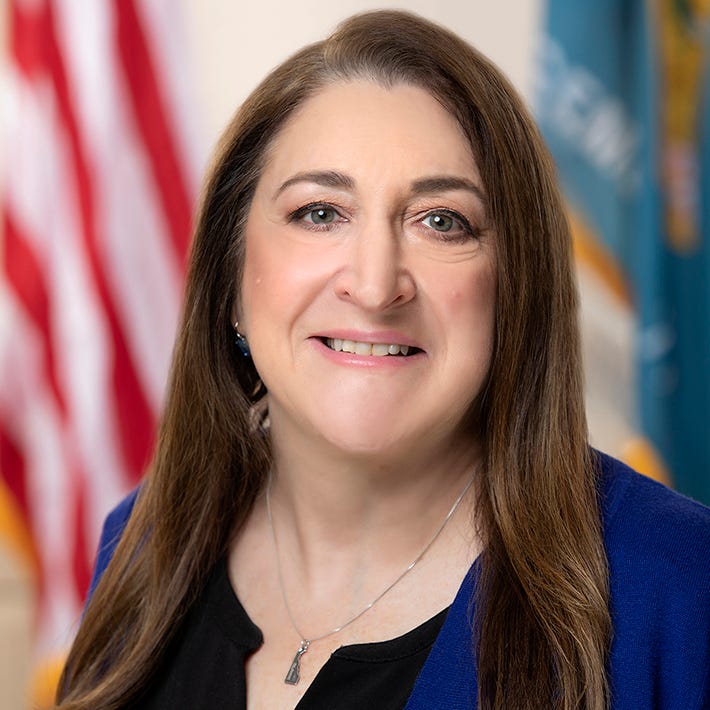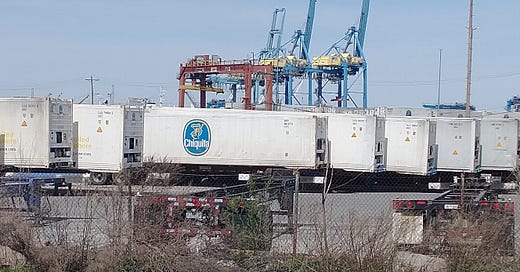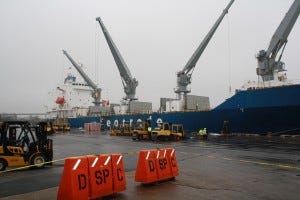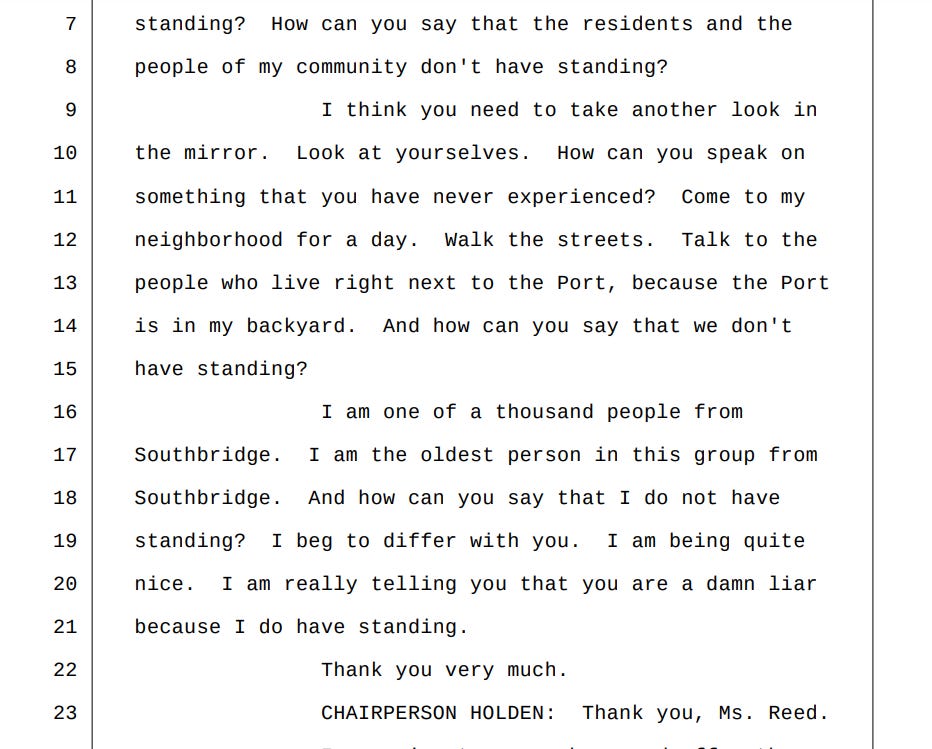OSHA inspectors fined the Port of Wilmington’s operator, GT USA Wilmington, more than half a million dollars for dozens of safety violations that federal officials say occurred during the previous eight months at the Delaware facility.
Issued two months ago and then again last week, the fines will likely mark the last of what have been years of turmoil for GT USA, a subsidiary of Emirati-based Gulftainer. In May, state port officials passed on the company’s bid to remain as operator of the Delaware port, instead choosing as a replacement a Massachusetts company, called Enstructure.
A final deal between the state, Enstructure, and GT USA’s creditors has not yet been announced.
The OSHA fines also add to a flurry of recent regulatory and legal activity that impacts the Port of Wilmington, including the settlement of a dormant environmental sanction levied against GT USA two years ago, and a court victory for a group of Port of Wilmington neighbors fighting for a say in how Delaware builds a new container terminal at Edgemoor.
In its reports describing the workplace violations, OSHA officials outlined a range of hazards at the Port of Wilmington, including lifting cables with visible rust, container cranes with exposed electrical wiring and missing drive motors, and the port bulkhead lacking a ladder to the river below.
OSHA also found several hazardous practices, such as longshoremen standing underneath hoisted cargo loads, and one instance of workers failing to disconnect a container from a truck before lifting it with a crane.
“On or about December 27, 2022, a container was hoisted before all chassis locks were disengaged, lifting the chassis and still-connected truck, resulting in employee injury,” one of three citation reports stated.
Five of the violations were “willful,” according to OSHA – the federal government’s workplace safety agency.
A spokesperson for GT USA did not respond to an email seeking comment for this story.
Beyond direct questions of safety, the violations indicate that Enstructure – or any other new port operating company – will be pressed to immediately spend money on deferred maintenance and best management practices when taking over the Delaware facility.
When emailed for comment, Delaware Secretary of State Jeffrey Bullock said the OSHA violations “are another reason we need a new (port) operator asap.”
“The DSPC board wants management that puts safety first and addresses problems like old tires, broken equipment, and general maintenance,” said Bullock, who chairs the board of the Diamond State Port Corporation, a state-owned entity tasked with overseeing the port’s private management.
What will lawmakers do?
Until recently, Bullock had been among GT USA’s chief advocates, quick to defend the company against years of complaints from port neighbors, contractors, and longshoremen.
The complaints from neighbors grew louder recently after GT USA allowed a piece of port property at Edgemoor to become a storage site for scrap tires.
The tire debacle – which seems to have prompted Bullock’s change of opinion about GT USA – could cost the state as much as $3 million.
In his email, Bullock did not address a question of whether the $544,000 in new OSHA fines will impact his negotiations with Enstructure, nor did he disclose the current state of those negotiations.
Last month, he told The News Journal that he hopes Enstructure will take over as the new operator this month.
Any deal that Bullock strikes with a new port operator must be approved by a handful of Delaware lawmakers, as well as the state controller general.
Those lawmakers include Senate President Pro-Tem David Sokola; Speaker of the House Valerie Longhurst; and the co-chairs of the bond bill committee, Sen. Jack Walsh and Rep. Debra Heffernan.
None of those lawmakers responded to requests for comment for this story.

Last month, Darrell Baker, a lobbyist for Holt Logistics Corp. pressed state legislators to reject Enstructure as the next operator of the Port of Wilmington, arguing that his client’s competing bid to take over the Port of Wilmington “was never shared” with the full Diamond State Port Corporation board of directors.
In an email to lawmakers, Baker distributed a spreadsheet of what he said were details of all bids submitted.
The document showed Holt Logistics offering more lucrative lease payments and initial investments for the port, however the company did not assume responsibility for dredging of the Delaware River, as Enstructure’s proposal did.
Holt Logistics is the owner of shipping terminals at the Port of Philadelphia and in New Jersey.
The Diamond State Port Corporation has not publicly shared the bids submitted earlier in the year by companies vying to take over the Port of Wilmington.
What prompted the OSHA inspection?
OSHA discovered the workplace violations during a series of visits to the Port of Wilmington that began Nov. 4 with an inspection of the facility’s cranes.
During the year prior to the inspection, several of the port container cranes had broken down at various times, according to multiple people who work at the Port of Wilmington.
One source also said last year that those cranes had not been annually inspected, as is required by law.
In response, I attempted at that time to find out the date of the most recent Port of Wilmington crane inspection. The endeavor entailed a frustratingly slow email conversation with an OSHA spokesperson who failed to provide concrete answers until Nov. 4, the day of the Port of Wilmington inspection.
On that day, the spokesperson told me that OSHA had no records of inspections for ship-to-shore cranes at the Port of Wilmington.
She did not respond to a follow-up question, asking how far back in time OSHA records go.
She also did not answer a recently emailed question about whether the Nov. 4 inspection occurred in response to my inquiries about crane inspections at the port.
GT USA’s previous sanction
Two years before OSHA fined GT USA, Delaware environmental regulators sanctioned the company with a nearly identical fine – but one that was never paid.
In March of 2021, the Delaware Department of Natural Resources and Environmental Control issued a $530,000 fine for what it said was GT USA’s failure to obtain a permit before installing diesel generators at the Port of Wilmington.
GT USA appealed the fine, and a hearing was scheduled for the following October in front of the Delaware Environmental Appeals Board.
On the date of the hearing, GT USA attorneys asked for, and were granted, a continuance, thus delaying the hearing to a later date.
But no subsequent appeal hearing ever occurred.
Asked last year how long the appeal could be delayed, a spokesman for the Environmental Appeals Board said “it would appear as though the continuance could be indefinite as long as both parties agree.”
It is not clear why DNREC agreed to delaying the appeal.
Asked about the case in April of 2022, DNREC spokeswoman Nikki Lavoie said in an email that the appeal had been “continued until December 30, 2021 at the parties’ request.”
It is unclear whether Lavoie had misstated the date as it had already passed when she sent the email.
There are no public records of a hearing on that date, and Lavoie did not respond to follow-up questions then of whether the appeal had been continued for a second time
She also did not respond to questions about whether DNREC would allow the case to be delayed in perpetuity.
More than a year later, DNREC finally made a statement regarding the GT USA sanction when announcing it reached a settlement with the company.
The deal was signed on May 26, four days after Delaware port officials announced that GT USA would not remain as the Port of Wilmington’s operator.
It reduced GT USA’s fine to an “administrative penalty” of $150,000, due within 90 days of the agreement.
It is unclear whether the port operator made the payment because DNREC’s spokespersons did not respond to a request to comment.
The settlement also required GT USA to commit to “environmental improvement projects,” near the port. One is a street sweeping project that requires a 2-year, $100,000 commitment. Another mandates that GT USA install an air quality sensor near the entrance of the Port of Wilmington and monitor it for 10 years.
Given that GT USA is unlikely to have operations or income in Delaware in the future, there appears to be little mechanism to force the limited liability company to comply with the yearslong terms of the new settlement.
Adding to the doubt is GT USA’s failures in the past to meet previous obligations to the state, including the reconstruction of a Southbridge neighborhood elementary school into a port worker training facility.
Port neighbors’ fight moves to state court
While DNREC appeared unwilling last year to enforce the GT USA fine, its attorneys did argue another case related to the port in front of the Environmental Appeals Board over that same period.
The case involved a group of residents who live near Port of Wilmington properties — including its current site along the Christina River and the site of a former chemical plant in Edgemoor, which the state wants to develop into a new container terminal.
In late 2021, the residents’ group challenged a key permit needed for construction of the Edgemoor container terminal.
Before beginning construction, they residents argued that GT USA first needed to sign an agreement with the community that would enshrine ways in which concerns over pollution and truck traffic could be mitigated.
During a subsequent appeals hearing, DNREC attorneys said the residents could not bring their challenge because they lacked an attorney — a legal requirement in Delaware for such organizations.
In response, the residents refiled the appeal as individuals, instead of a group.
DNREC attorneys then argued during another appeals hearing last July that the port neighbors lacked standing to challenge the permit.
The assertion shocked the residents who questioned how neighbors to a development could lack the standing to question it.
Marie Reed, a longtime leader in Wilmington’s Southbridge neighborhood, said during the July appeals hearing that her community had suffered for years from poor air quality and high cancer rates that she attributed to the current port facility along the Christina River.
“As a lifelong resident of Southbridge, how can you say that I don't have standing?” Reed asked. “How can you say that the residents and the people of my community don't have standing?”
Ultimately, the Environmental Appeals Board sided with DNREC, prompting the port neighbors to appeal the decision to Delaware Superior Court.
Last month, Superior Court Judge Sheldon K. Rennie denied DNREC’s motion to dismiss the case.
In the ruling, Rennie said the residents “merely seek” to send the case back to the Environmental Appeals Board “so they can be afforded a ‘public hearing’ on the merits of their standing claim.”
It is not yet clear what position Enstructure will take toward the group of port neighbors. The company has not addressed the issue in the few public statements it has made since being named as the state’s choice as the new port operator.
In May, Jeffrey Richardson, the leader of the neighborhood group, pleaded with the Diamond State Port Corporation board to include in any deal with Enstructure a promise that the port operator would sign a contract with neighbors.
He also called for the state to hold an open public meeting, in which community members could ask questions of port officials.
“Since we are committed to collaborating and working with you, then work with us,” said Richardson, who chairs the neighborhood group, called the Delaware Community Benefits Agreement Coalition.
Contact Karl Baker at kbaker6@protonmail.com or on Signal at 206-595-0057.
Click the download buttons below to view the OSHA violations reports.







“She also did not answer a recently emailed question about whether the Nov. 4 inspection occurred in response to my inquiries about crane inspections at the port.” 😮👍🏼